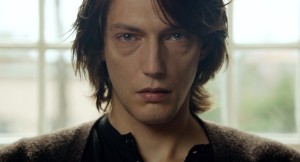 Review: Wisconsin Film Festival
Review: Wisconsin Film Festival
Cosmos | Andrzej Żuławski | France, Portugal | 2015 | 103 minutes
UW Cinematheque, Friday, April 15, 11:15am»
Sundance Cinemas, Tuesday, April 19, 8:30pm»
James Kreul kicks off our examination of Wisconsin Film Festival titles with a look at the final film from the late Andrzej Żuławski. Cosmos combines a fluid, rhythmic visual style with a playful use of spoken language to deliver a frenzied ode to obsession that stays pretty hot as long as the tease remains ambiguous.
The late Andrzej Żuławski is probably best known for his 1981 film, Possession, with Isabelle Adjani and Sam Neill (the UW Cinematheque showcased it in their Summer 2012 season) and those who have seen it will recall a frenzied tone. With his final film, Cosmos, that tone returns but this time modulated to fit a boarding house on the Portuguese coast. Modulated, but still just as intense. With his adaptation of Witold Gombrowicz’s reportedly unadaptable novel, Żuławski delivers one last fever dream of angst and obsession, but still provides touches of humor and playfulness.
Two young men, Witold (Jonathan Genet, who looks like how the French look in anime) and Fuchs (Johan Libéreau) meet while searching for seasonal housing in a coastal town. Fuchs is playing hooky from his fashion house employers. Witold is supposed to be studying to re-take his flunked law school exams, but really he just wants to be a writer. We often see him emphatically reciting poetry or composing his own prose, allowing him to externalize a wide range of emotions. He is particularly moved during a walk in the woods when he discovers a dead sparrow, deliberately but mysteriously hung by the neck with a blue thread.
The two men find lodging in the house of Madam Woytis (Sabine Azéma) and her second husband Léon (Jean-François Balmer). The couple lives with Madam’s daughter from her first marriage, Lena (Victória Guerra) and Lena’s new husband Lucien (Andy Gillet). Also present is the live-in maid, Catherette (Clémentine Pons) who quietly observes her more flamboyant employers; she is shy in part due to a cleft palette.
Many of the scenes alternate between wild exuberance and quiet, subtle, textured observations, as we work through variations on shared meals and other routines. The attraction between Witold and Lena is immediately obvious to everyone except them. Witold’s slowly growing obsession eventually intertwines with his investigation of the dead sparrow.
The structure of the film might best be described as one of repetition and variation. Not all that much happens to move the plot threads forward, but certain objects and images begin to repeat and resonate. Witold’s story of the dead sparrow reminds Lucien of a dead chicken; both images begin to play off of each other. A teapot that appears in a key scene in the second act has a notable presence in a scene in the third; its meaning is less significant than its emotional resonance with that repetition. These objects and images accumulate and are occasionally recapped with brief montages; these might be dismissed as an art film sin of excess in other films, but they have an emotionally and intellectually satisfying effect here.
Eventually the sexual tension begins to come to the surface, and the repeated images begin to convey what Witold can’t seem to, despite his fluid language skills.
There are some distinct pleasures in watching Cosmos, even when it bogs down a bit in some stretches. The first is a wonderful visual rhythm in many scenes, especially early in the film, which carries the momentum even when not very much is going on. All stylistic options seem to be on the table, and some techniques briefly appear to punctuate particular moments then just as quickly disappear. In a scene where Witold and Fuchs investigate the house’s back yard, smooth yet quite pronounced zooms help complete a dance between the characters and the camera. Staging, camerawork and performances have a floating quality to them, until they’re occasionally deliberately popped by abrupt sound and image cuts.
Another pleasure has to do with language, but this is a bit harder to explain because I’m perfectly aware that quite a bit gets lost in translation. There are enough puns here for me to realize that I’m missing many more. There’s a general playfulness with language that infects most of the characters, but especially Witold and Léon. It’s impossible to catch everything, including the numerous literary and cinematic references, but it is fun trying.
As a would-be writer, Witold’s words flow from him like someone performing a Godardian voice over in 1967. Even when spouting abstract purple prose, there’s always something concrete and vivid that’s often difficult to process as we listen to him.
Léon, on the other hand, has a wonderfully mumbling, bumbling rhythmic speaking style punctuated by repeated and rhyming extra syllables. The subtitles in the version I saw try to capture this, so it is also hard to process the written and spoken words simultaneously.
One word that appears in the subtitled translation, “bleurgh,” captures the spirit of what happens with language in the film as a whole. It repeats and varies is meaning and function through low brow puns, cinematic jokes (“Spielbleurgh”) and expressions of existential angst.
The final act moves to more open spaces, and to Lena and Lucien’s new home near the water. Outside of the confines of Madam Woytis’s house, many issues bubbling beneath the surface are finally addressed, but in a way that raises just as many questions as there are answers. The tension between Witold and Lena rises to the point that it pressures the narration to shift into even more ambiguity. This is somehow even more satisfying, because everything is very hot as long as everything is a tease.